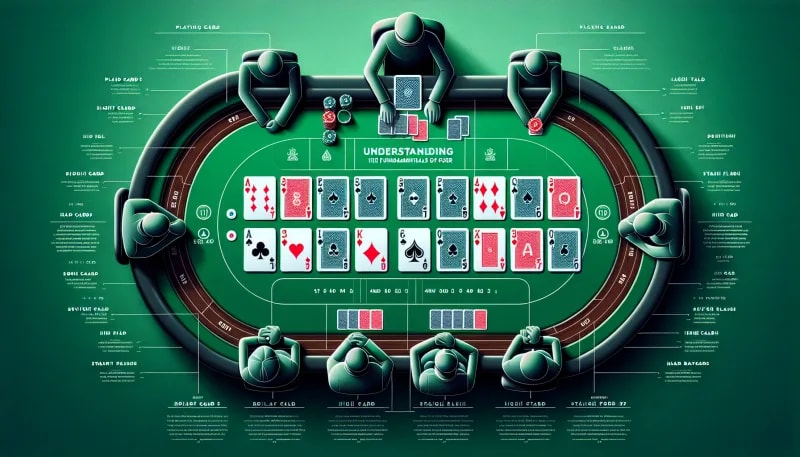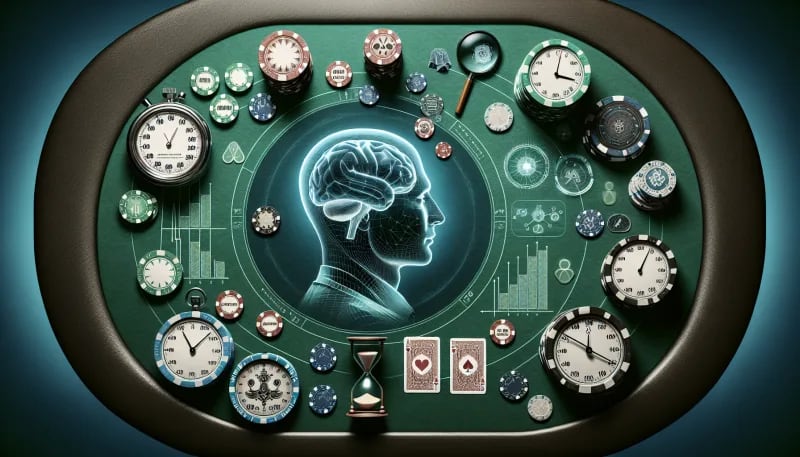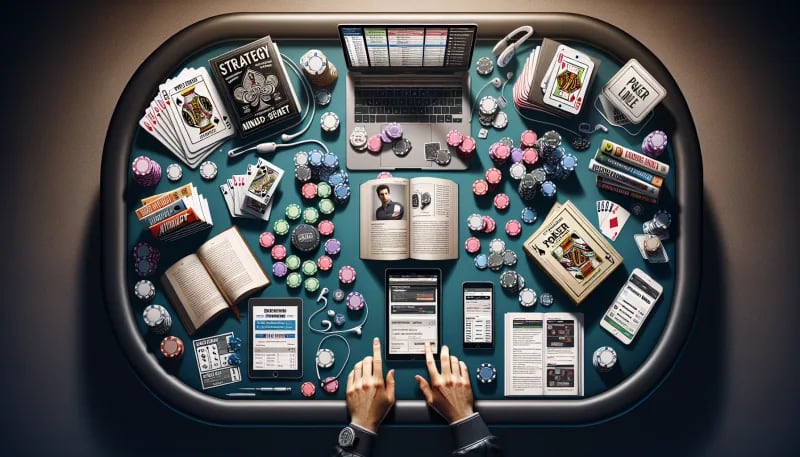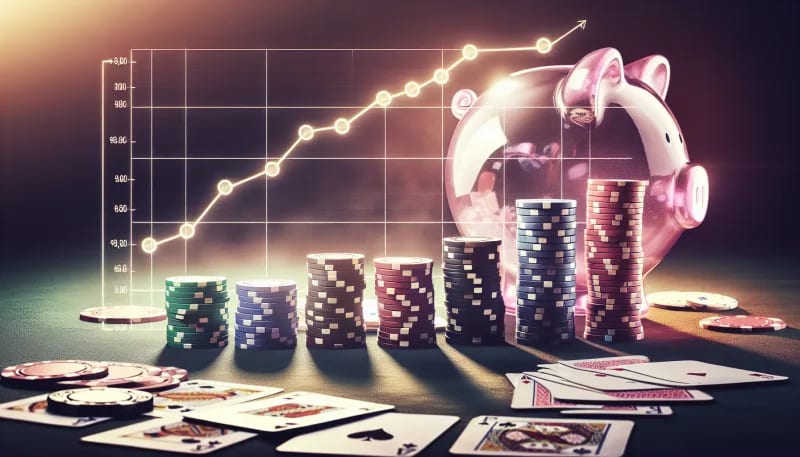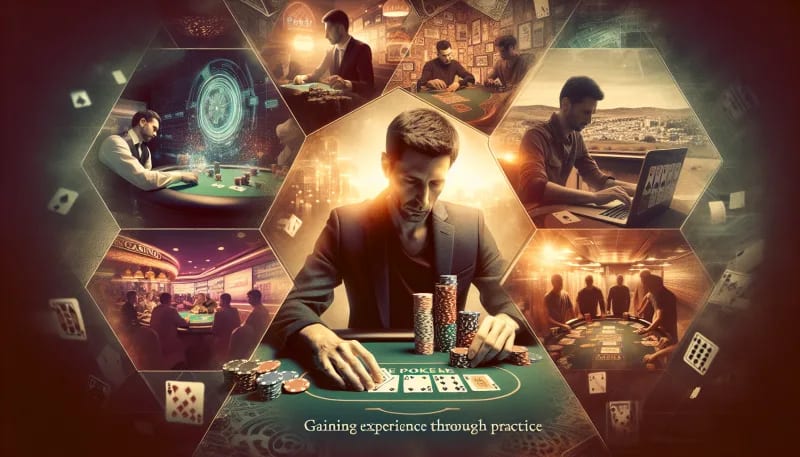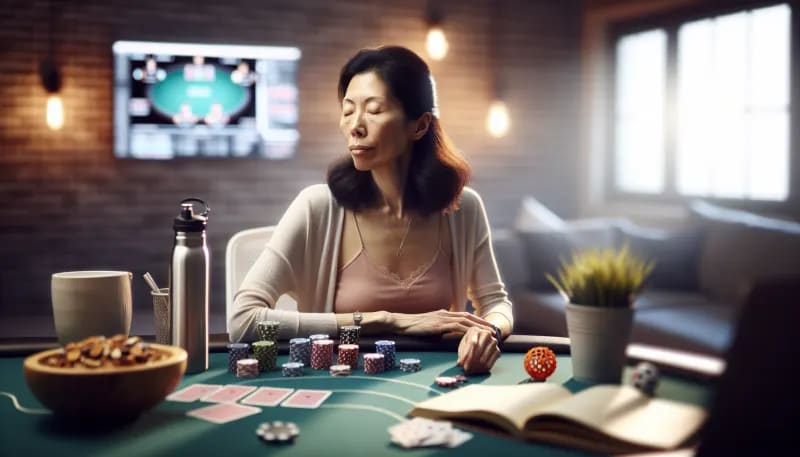Become Professional Poker Player: Laying the Groundwork for Success
Understanding the Fundamentals of Poker
Before diving into the deep end, let's get comfortable with the shallow waters. Ever tried building a house starting with the roof? Of course not. It's the same with poker. A strong foundation in the game's mechanics is key before eyeing the pro league.
Poker isn't just about the cards you're dealt; it's how you play them. And to play them right, you need to grasp the basic rules. Each variant has its twists, but the core remains constant: you’re looking to make the best five-card hand possible. Texas Hold'em, perhaps the most popular form, starts with two cards to each player, followed by a series of community cards laid out in the 'flop,' 'turn,' and 'river' stages. Sound simple? Looks can be deceiving.
Now, what makes a winning hand? That's where hand rankings come in. They are the ABCs of poker. The top dog is the Royal Flush, followed closely by the Straight Flush, Four of a Kind, Full House, and the list goes on down to a High Card, the lonely solo act. Remember, a Full House doesn't beat a Straight Flush. Shouldn't you know the hierarchy before claiming the throne?
Each hand is a series of decisions: bet, call, raise, or fold? And here's where the rubber meets the road. The gameplay is cyclic – bet, gather intel, make decisions, and adapt. Rinse and repeat. A keen understanding here can be the difference between a rookie mistake and a seasoned move.
Assuming you've got these basics down, are you ready to think like a pro? It's not just about knowledge, but how you use it. Still, without these fundamentals, tactics and strategies are just castles in the air, don't you think?
As we segue into the next chapter, Skills and Qualities of a Professional Poker Player, keep in mind: pros didn't leapfrog the basics. They mastered them. So, should you.
Skills and Qualities of a Professional Poker Player
After grasping the fundamentals, it's pivotal to hone the skills and develop the qualities that set professionals apart from the rest. Analytical thinking? It's non-negotiable. I delve into each hand's math, probabilities, and varied outcomes. I ask myself, "What's the most profitable play here?" It's not just about the cards. The choices must be data-driven.
How about patience? It's my best friend at the table. Sometimes, the cards seem to conspire against me. That's when I remember that poker is a marathon, not a sprint. Good things come to those who wait, right? But it's more than a cliché; it's a game-winning strategy.
Emotional control is my silent guardian. I keep my highs modest and lows in check. No room for tilt here. My opponents should never read my frustrations or giddiness. That's giving away power. And power in poker is as good as money.
Speaking of reads, the ability to read opponents is akin to a superpower. But it's not about mind reading; it's about pattern recognition and psychology. Each gesture, each bet, tells part of a story. I piece them together, formulating a narrative that guides my strategy. It gives me the upper hand.
Now, let's face it, skills are critical but what about the core qualities? An unwavering commitment to growth, a thick skin for inevitable losses, and a stoic dedication to smart bankroll management. These qualities ensure that I'm not just surviving in the game, but actively thriving.
As I sharpen these skills and cement these qualities, I know I'm on the path to distinction. And what's next on that path? Educating Yourself and Continuous Learning. Because in poker, as in life, the quest for knowledge never truly ends.
Educating Yourself and Continuous Learning
Building on the skills and qualities that shape a professional poker player, it's clear that refinement through education is non-negotiable. Why? Because poker is a constantly evolving game. Strategies that worked yesterday might not hold up tomorrow.
Think you've learned everything there is about poker? Think again. The best players in the world understand that poker is a never-ending lesson. It's like water—always moving, reshaping, and presenting new challenges. And so, our approach towards education must be fluid, adaptable, and continuous.
Books are a great start. They lay down fundamental strategies and the psychology behind them. But aren't we past the era of Doyle Brunson's "Super System"? Absolutely. That's why I constantly refresh my reading list with updated materials that capture the nuances of the modern game.
Forums and online communities are where the rubber meets the road. Here, I interact with peers, pick brains, and even have my strategies challenged. It's a melting pot of ideas, a daily scrimmage against diverse poker intellects.
Online courses and videos? Priceless. They allow me to step inside the minds of poker mavens. I watch their play, listen to real-time reasoning, and adapt those high-level concepts into my game. It's like a direct line to the thought processes of the game's best.
Every minute of study pays dividends at the table. It's the edge in the unforgiving arena where critical thinking and decision-making separate the winners from the rest. Lifelong learning isn't just about staying competitive, it's about staying ahead of the curve.
As we shift to the next critical aspect, Bankroll Management, remember this: Knowledge is power. The more I learn, the better I manage my risks. And with better risk management, the longer and more effectively I play.
Bankroll Management
Transitioning from educating yourself about poker, let's talk money—specifically, how to manage your poker bankroll. After all, what's poker without chips to play with? Effective bankroll management can be your safety net, ensuring you can weather the ups and downs that are part and parcel of the game.
First, game selection is paramount. Are you choosing games within your financial comfort zone? You shouldn't sit at a table where the buy-in is so high that it makes you tremble with each bet you make. An essential rule I follow is to have at least 20-30 buy-ins for the limit I am playing. This buffer allows me to play my best game without the fear of going broke after a few bad sessions.
Understanding variance is another key aspect. Remember, poker is a long-term endeavor. Short-term wins or losses can be misleading. Your bankroll should be substantial enough to absorb the natural fluctuations of the game. Don't let a winning streak inflate your ego or a losing streak sink your confidence. This comprehension of variance will keep you grounded, ensuring you don't make reckless decisions.
Now, when to move up in stakes? This is critical. It's tempting to jump to higher stakes after a hot run. But here's where discipline plays its part. A solid approach is to move up only when you have at least 30 buy-ins for the next level. This isn't just about having the funds; it's about being confident in your skill level too. If you can easily best your current field, then why not challenge yourself a bit more?
Timing is everything. Move up when you are winning consistently, and your bankroll allows it without jeopardizing your financial stability. If you hit a rough patch, don't hesitate to move back down and rebuild. That's not failure; that's smart bankroll management.
Once you've got the hang of bankroll management, you're setting yourself up to gain invaluable experience. Practice might not make you a poker sage, but it certainly helps. And with a well-managed bankroll, you'll be able to practice aplenty. On to the next vital step: 'Gaining Experience Through Practice'.
Gaining Experience Through Practice
Mastering the art of poker isn't just about learning the rules and strategies. It's also about gaining the practical experience necessary to bring those lessons to life. After all, effective bankroll management is only one piece of a much larger puzzle, isn't it?
Practical experience is the real teacher in poker. Sure, you can study hand ranges and theorize about bluffing frequencies all day, but until you're sitting at a table, cards in hand, it's all just theoretical. That's why I always tell newcomers: Get in the game.
The best way to learn is through diversity in gaming experiences. Online platforms can offer a wide range of stakes and styles at any hour of the day. They're a convenient way to put your skills into action. And let's not overlook the importance of reading your opponents, which comes to life in local casinos. Even friendly home games play a crucial role. They often feature unconventional plays and a relaxed atmosphere that can be perfect for trying new strategies.
Ask yourself, are you alternating between cash games and tournaments? Are you experimenting with different forms of poker like Omaha, Stud, or Draw? I've found that the broader your exposure, the more complex your understanding of the game becomes.
And consider this: how well do you think you can manage a bankroll if you haven't felt the pressure of real stakes? Or the thrill of a real win? Each hand plays a part in developing your poker intuition. Remember, the skills you learn at the table are cumulative.
Linking bankroll management to true poker experience is crucial. Without the practical understanding that comes from live play, bankroll strategies lack context. And as you gain experience through practice, don't forget the next step: networking and building connections. The people you meet at the tables are part of your learning, too.
To sum it up, there's no substitute for the real deal. So, I encourage you - play widely and play wisely.
Networking and Building Connections
So, you've been gaining experience through practice, right? But what's next? Enter the power of networking within the poker community. Trust me, it's a game-changer.
For starters, networking can majorly enhance your learning curve. Imagine accessing a hive-mind of poker knowledge, all just by having the right contacts. By connecting with seasoned players, I've gained insights that would've taken me years to learn alone. Get this -- sometimes a single tip from a pro can significantly shift your strategy.
And then there's finding profitable games. Ever wonder how some players always seem to be in the right place at the right time? Networking, my friend. Being in the know can steer you towards the softest games. Plus, by getting to know the regulars, you can gauge the dynamics of a table even before you sit down.
Now, how to connect? It's not just about being a face in the crowd. At live events, I make it a point to introduce myself, be friendly and genuinely interested in other players. You'd be surprised how a simple conversation can lead to a lasting poker connection. And remember, first impressions matter.
Online, forums and social media groups are where it's at. Don't just lurk – participate. Share your experiences and ask for advice. The poker community is surprisingly supportive, and you can make connections that transcend the virtual realm.
Have you considered the role of networking apps specifically designed for poker players? Yep, they exist, and they're a goldmine for finding both local and online games. Initiate or join groups, and soon you'll be part of a network that's always buzzing with activity.
But here's the kicker: while networking can open doors to an array of opportunities, don't forget the importance of balance. In the upcoming section, we'll delve into maintaining your Mental and Physical Health. After all, what good is a great network if you're not at the top of your game?
Mental and Physical Health
Transitioning from Networking and Building Connections, I’ve gained insights that extend beyond the felt. Maintaining optimal mental and physical health is a cornerstone of poker success, yet it's often overshadowed. Why is it so crucial? Simply put, a healthy body fosters a sharp mind.
I've learned that the mental grind of poker requires a resilience that's bolstered by physical well-being. Long sessions can strain both the mind and the body. To combat this, I start with regular exercise. It's not about becoming a marathon runner. It's about keeping your body tuned, as you would your poker strategy.
Striking a balance is key. Integrating yoga or stretching exercises helps maintain flexibility and reduce the typical aches of sitting for extended periods. It's amazing how physical tension can translate to mental stress. Regular breaks during play to walk or meditate can dramatically improve focus.
Nutrition should never be an afterthought. Those quick snacks can lead to sugar crashes that dull decision-making. I ensure my diet is rich in nutrients to sustain energy levels throughout a game. Hydration is another non-negotiable – water is your brain’s best friend.
But what about the mind? Poker is a mental marathon and the stress of playing professionally can be immense. How do I keep my wits sharp and stress levels in check? Mindfulness and structured reflection. Daily meditation and journaling help me maintain mental clarity. They aid in understanding my emotional responses to the game, which is critical to staying rational under pressure.
Importantly, I advocate for regular sleep patterns. Sleep is not a luxury, it's a necessity. It consolidates skill learning and emotional wellbeing. Without it, even the most robust strategies can crumble.
As I pave the way toward Making the Transition to Professional, remember that poker is not just intellectual but also physical warfare. Your mind and body are your most valuable assets. Treat them well, and they'll carry you to triumph.
Making the Transition to Professional
You've maintained your mental and physical health, as discussed earlier. Now, what's next? You're pondering turning pro. It's not just about playing cards; it's about turning poker into your livelihood.
Let's talk money first, because without proper financial planning, your pocket aces will crumble under financial pressure. Set aside a substantial bankroll – think of it as your new business's start-up capital. Have you got at least 6 to 12 months of living expenses covered? This isn't a gamble; it's a safety net.
Then, track your income and expenses meticulously. Poker earnings can be inconsistent, so a detailed financial log is your best friend. Recognize that breakeven periods or downswings don't mean failure, they're just part of the game.
Now, legal matters. Different places, different rules. Research the taxation laws for poker winnings in your area. Understand you may need to file differently as a professional. Consulting with a tax professional isn't just wise; it's essential. You don't want to bluff your way through tax laws.
Lifestyle shifts are pivotal. Brace for impact. Professional poker isn't a 9-to-5 job. Irregular hours can strain relationships and social life. Can you maintain balance? Will you manage the solitude when grinding online or the constant travel for live tournaments?
And remember, the grind can be exhausting. Setting a strict schedule—and sticking to it—is as crucial as choosing when to push all-in. Incorporate breaks, exercise, and relaxation into your routine. Sustainability is the name of the game.
To sum up, transitioning to a professional poker player isn't just a skill upgrade. It's a holistic life change. Are you ready to bet on yourself? Keep financial planning tight, legal ducks in a row, and lifestyle adjustments in check. That's the real royal flush of going pro.

